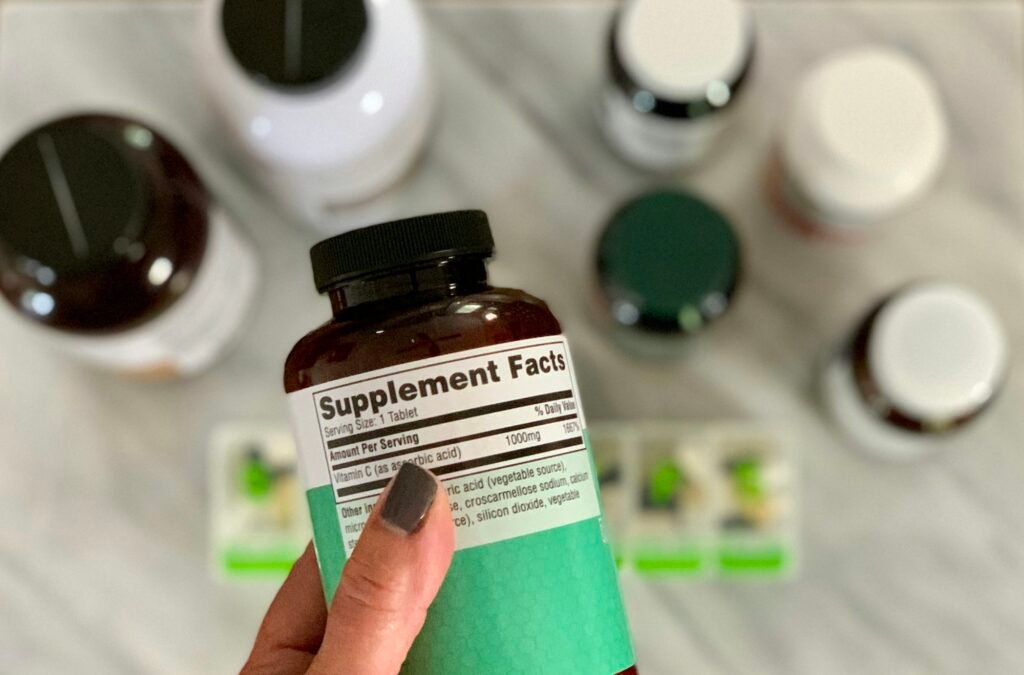Herbal Supplements

Herbal Supplements
What are Herbal Supplements?
Herbal Supplements are dietary products containing concentrated forms of herbs, their extracts, or various plant parts, including roots, leaves, or flowers. Designed for easy consumption, Herbal Supplements present a convenient way to incorporate the potential health-promoting properties of herbs into your daily routine. Common forms include capsules, tablets, tinctures, powders, and teas.
How Can Herbal Supplements Help You?
Herbal Supplements offer potential support in several ways:
- Targeted Health Concerns: Many Herbal Supplements focus on specific health needs, providing support for issues like immune health, stress reduction, digestive complaints, or sleep difficulties.
- Overall Wellness Boost: Certain Herbal Supplements contain adaptogenic herbs or nourishing botanicals that aim to enhance general well-being, energy levels, and resilience.
- Holistic Approach: Herbal Supplements resonate with individuals seeking natural options to complement their overall health and align with the principles of holistic wellness.
- Supplementing Dietary Gaps: In situations where dietary intake of specific nutrients may be inadequate, Herbal Supplements can help fill the gaps and provide concentrated forms of beneficial plant compounds.
- Convenience: For those seeking easy-to-integrate health practices, Herbal Supplements offer a readily accessible way to harness the power of herbs in a convenient format.
What are Herbal Supplements Good For?
Herbal Supplements may be considered for a variety of concerns:
- Immune Support: Herbs like echinacea, elderberry, and astragalus are often included in Herbal Supplements formulated to boost the immune system.
- Stress and Sleep: Herbal Supplements with calming properties utilize herbs like chamomile, lemon balm, passionflower, and valerian root to support stress reduction, relaxation, and improved sleep.
- Digestive Health: Herbs such as ginger, peppermint, and fennel found in Herbal Supplements may aid in soothing digestive upset, bloating, and gas.
- Mental Focus and Energy: Herbal Supplements may include adaptogens like Rhodiola rosea or ashwagandha, known for supporting energy levels, mental clarity, and the body’s stress response.
- Women’s Health: Herbal Supplements specifically formulated for women’s health may contain herbs like chasteberry, black cohosh, and red raspberry leaf, traditionally used to address hormonal balance, menstrual discomfort, and menopausal symptoms.
Benefits of Herbal Supplements
Herbal Supplements offer several potential benefits:
- Natural Support: For those aligned with natural health approaches, Herbal Supplements provide options derived from plants with a tradition of use in wellness practices.
- Convenience: The pre-formulated and readily available nature of Herbal Supplements offers a simple way to incorporate herbal support into one’s routine.
- Complementing Other Approaches: Herbal Supplements can often be safely integrated alongside conventional medical treatments or other holistic modalities, offering a multi-pronged approach to health and well-being.
- Addressing Diverse Needs: The wide variety of Herbal Supplements caters to various health concerns, from immune support to sleep aids and beyond.
- Empowering Self-Care: Herbal Supplements can play a role in proactive self-care practices, giving individuals options for supporting their health naturally.
What to Expect from Herbal Supplements with a Practitioner
While Herbal Supplements are widely accessible, consulting a qualified practitioner can maximize benefits:
- Holistic Assessment: Practitioners offering Herbal Supplements consider individual health history, current concerns, and medications to ensure suitable recommendations.
- Personalized Guidance: Practitioners assist in selecting Herbal Supplements specifically tailored to your health goals and needs.
- Safe and Effective Use: Practitioners provide dosage guidelines, potential interactions to watch for, and address any questions or concerns.
Similar Modalities to Herbal Supplements
Other health practices share common ground with Herbal Supplements:
- Herbal Remedies: The broader term “herbal remedies” encompasses Herbal Supplements along with customized blends offered by herbalists, emphasizing personalized formulas based on individual needs.
- Naturopathic Medicine: Naturopathic doctors often recommend Herbal Supplements within a holistic treatment framework addressing diet, lifestyle, and other modalities.
- Traditional Chinese Medicine (TCM): TCM sometimes incorporates Western Herbal Supplements alongside traditional complex herbal formulas.
Final Thoughts
Herbal Supplements provide a convenient and accessible way to harness the potential of herbs for maintaining health and addressing specific concerns. When choosing Herbal Supplements, look for high-quality products from reputable companies, prioritize organic ingredients, and always consult your healthcare provider, especially if pregnant, breastfeeding, or on medications. By incorporating Herbal Supplements responsibly and seeking guidance when needed, they can be a valuable tool within a holistic approach to well-being.
Scientific References
While research on individual herbs is most prevalent, here are some resources related to Herbal Supplements and quality considerations:
- Dwyer, J. T., Coates, P. M., & Smith, M. J. (2018). Dietary supplements: Regulatory challenges and research resources. Nutrients, 10(1), 43. https://doi.org/10.3390/nu10010043
- Posadzki, P., Watson, L., & Ernst, E. (2013). Herb-drug interactions: an overview of systematic reviews. British Journal of Clinical Pharmacology, 75(3). 603-618.
Recommended Reading
- Gladstar, R. (2012). Rosemary Gladstar’s medicinal herbs: A beginner’s guide. North Adams, MA: Storey Publishing.
- Hoffmann, D. (2003). Medical herbalism: The science and practice of herbal medicine. Rochester, VT: Healing Arts Press.
- Upton, R. (Ed.). (2016). American Herbal Pharmacopoeia: Botanical Pharmacognosy – Microscopic Characterization of Botanical Medicines. Boca Raton, FL: CRC Press, Taylor & Francis Group.
FAQ: Herbal Supplements
Are all Herbal Supplements safe?
While generally safe, some herbs may interact with medications, worsen existing conditions, or be inappropriate for individuals with specific vulnerabilities (pregnancy, young children). Always consult your healthcare provider prior to use.
How do I choose reputable Herbal Supplement brands?
Prioritize brands with transparent labeling, third-party certifications of quality (such as USP or NSF), and verifiable sourcing practices. Research companies and look for those using organic ingredients whenever possible.
Can Herbal Supplements replace conventional medications? No
No. Herbal Supplements should not replace prescribed medications. Always discuss medication changes with your healthcare provider, even those involving natural supplements.
What are common side effects of Herbal Supplements?
Side effects are usually mild, if they occur at all. Digestive upset, headaches, or allergic reactions are possible in some cases. Discontinue use and consult your doctor if experiencing adverse effects.
Where can I find reliable information about Herbal Supplements?
Look for reputable resources like the National Institutes of Health, websites of professional herbal organizations, or consult with a qualified naturopathic doctor or herbalist.
Related Practitioners
Rita Mustafa
Healing Beyond Boundaries: Personalized Holistic Wellness for You and Your Pets
- City Centre, Windsor, ON, Canada
- +1 (678) 210-5270
Rita’s years experience in the health and Fitness, coupled with her educational background and ongoing activities, have inspired her to… Read More
Farrah Weir. I am.
Empower Your Journey, Heal Your Soul, Ascend Beyond Limits with Quantum Healing
- Johannesburg, City of Johannesburg Metropolitan Municipality, Gauteng, 2001, South Africa
- (678) 210-5270
Farrah Weir is a quantum surgeon, cosmic and conscious life coach, and intuitive medium dedicated to helping individuals heal trauma,… Read More

















